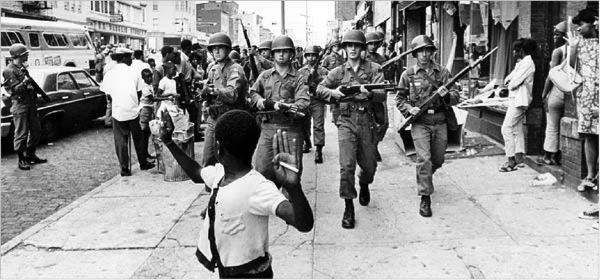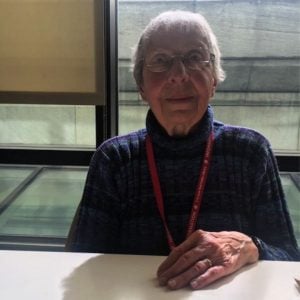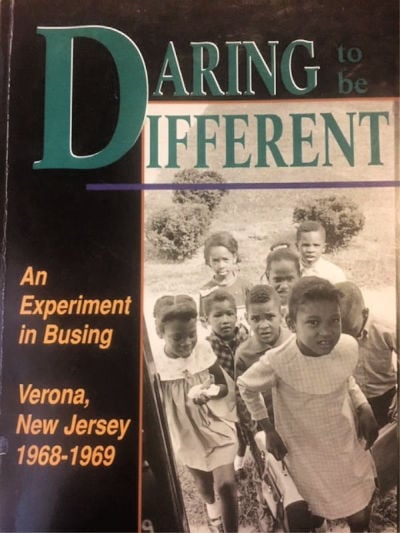
On December 10, 2019, AP U.S. History (APUSH) students at Verona High School received a rare experience: An account of Verona’s short-lived school busing program, as told by 98 year-old Hilda Jaffe, who was president of the Verona Board of Education in 1969. The visit was organized following the realization that 2019 marked the fiftieth anniversary of the program, and that few current Verona residents know of its history.
Jaffe’s presentation did not begin with a mere recounting of the busing program. She provided a comprehensive portrait of the state of the civil rights movement and race relations at both a national and local scale in 1969, essential for the understanding of Verona’s busing program. Points discussed included the Civil Rights Act of 1965, the assassinations of both famed civil rights leader Dr. Martin Luther King, Jr. and Democratic presidential candidate Robert F. Kennedy in 1968, and, most critically, the Newark riots of 1967. These riots, sparked by decades of white flight from the city coupled with redlining policies and police brutality aimed at Newark’s rapidly expanding black population, ignited tensions within Essex county–and these tensions remained in place when Verona made the bold step forward to institute a school busing policy.
The busing policy was proposed by the members of Verona’s BOE, and was initially looked on as “a great idea,” Jaffe said. In 1969, Newark’s school system was crippled by overcrowding and underfunding, while the Verona schools had an excess of resources, especially at the elementary level. Thus, the board members took it upon themselves to help alleviate the situation of their urban neighbors, and proposed to have 37 first and second grade students bused from Newark to Verona to attend school, following the example set by school districts in Boston, Mass.

The board members were in for a rude awakening after revealing the proposal to the public, however, as throughout the summer of 1969, an ugly, prejudicial battle was waged in Verona. Those supporting the policy came into fierce conflict with those opposed, in an atmosphere Jaffe described as “explosive.” Almost overnight, neighbors no longer spoke to neighbors, harsh words were exchanged behind closed doors and in newspaper op-eds, and those opposed to the proposal called for a referendum, claiming that it should be up to the community to decide. The battle came to its head at a board meeting at which 2,000 people packed into Verona High School to ask questions and voice their opinions, a meeting that lasted from 8 p.m. to 1 a.m. (It is important to note that board meetings rarely drew more than a hundred community members at that time.) Jaffe was blunt in describing the atmosphere among the opposed: “People were knocking on my door, yelling at my house, because I was the ‘Jewish b—h’ who supported the program. At one point, I thought I was going to get a cross burned on my lawn.”
By the time fall 1969 came around, though, the busing program was approved by the BOE in a 4-to-1 vote, and once underway went smoothly, with the Newark children easily assimilating into their classes and never once encountering hostility from opponents in the town. Unease still boiled beneath this seemingly placid surface, however, and the following year the program was suspended, as Jaffe was voted out of her board position as president. Jaffe was candid about losing her post: “I was forced from public life regarding this [the busing program]. I got nervous when people would approach me and say ‘Oh, are you Mrs. Jaffe?’ because I had no idea what their intentions were.” Jaffe expressed regret at the loss, but noted that in her long years of public service, she views the busing program as a major accomplishment of her career.
When the formal presentation ended, students were able to ask Jaffe questions, which brought numerous fascinating pieces of information to light. Jaffe discussed the demographics of Verona in the 1960s, as “mostly blue-collar, mostly Republican. Many of them had moved out of Newark or had parents of grandparents who did so, which was rather ironic.” She talked about the “polite racism” and small but notable redlining then present in Verona, saying “Verona had a very, very small African-American population, but there was an enclave off of Pompton Avenue, close to the border of Montclair, where black families seeking to move were essentially forced to buy homes.” She also said that, following the busing program, there “were 10 years of tension, as the [school] board couldn’t get a budget passed without resistance,” and that some close to the black enclave had opted not to participate in the busing program, saying “We have our own.”
“In the end, it happened, and if we hadn’t done it, we’d never have gotten the reaction to it,” Jaffe said. She expressed hope that the residents of Verona, then and now, would take something away from the program, “because it was based on fear of the ‘Other’, that the Other was so different.” Based on the experiences of the Newark children, though–some of whom even reconnected with their Verona classmates years later–the Other was not the Other, but the image of the Other created in the minds of the anxious and prejudiced. Clearly, the divides separating the residents of Newark and Verona were based in irrationality and racism, and Jaffe expressed a desire for these divides to be made non-existent in the future.
Reactions to the presentation were positive, as both students and adults were active and engaged with Jaffe’s sharp style and uncompromising commitment to the ideals of equality and fairness for all. APUSH teacher Robert Maher said that he hoped “students would gain an understanding of the civil rights movement from a perspective different from the norm, and come to know Verona’s own little place in history,” and spoke on these themes again following the talk. Student reactions also expressed fascination with Verona’s place in history, as Jaffe noted that Verona was the only district in all of Essex County to institute a busing program. (Jaffe also spoke to students at H.B. Whitehorne who are preparing entries for this year’s National History Day contest on the theme of “Breaking Barriers.”)

Many of the APUSH students have parents or grandparents who lived in town during the program, and expressed this later. “I thought it was really interesting, since my dad and his family were living in Verona at the time, and my uncle was actually only two or three years younger than the kids from Newark who came to Verona. It was cool to hear about an event that my grandparents, uncles, and dad experienced,” said Cailan Compierchio. Others commented on Jaffe’s extensive knowledge base: “She was very informative on the history of the time period, and not just the busing [program],” said Madrid Rodner.
Jaffe now lives in Manhattan, but voiced deep affection for the Verona community and its current members. In closing, she noted that a book was written on the subject called Daring to be Different, which was written by a former Verona resident and currently available at the Verona Public Library, and recommended it for anyone seeking further information on the subject.
With talk of a spring visit in the air, the mood leaving the classroom was jubilant, as all voiced their final thoughts on Jaffe’s visit, and as put best by one APUSH student: “She was badass!” Verona High School is grateful for Hilda Jaffe’s commitment to expanding the knowledge base of this crucial part of local history, and looks forward to any further engagements.
Daphne Glatter is a junior at VHS.


What a thoughtful and beautiful piece of reporting! Kudos to Daphne– I would say she has already begun her career as a journalist!
I was a junior at VHS at the time & worked on the school newspaper, the Fairviewer. Eliza Weitz & I did an article about our experience interviewing the Grand Dragon of the KKK who lived in Caldwell. He told us that they had intended to parade down Bloomfield Ave protesting the program dressed in their hoods & robes (He showed us his bright green outfit). I think they needed a permit & were declined and decided not to do it anyway. A very eye opening experience.
I was at Forest Ave during the busing experience, we never felt any pressure or predudice, we were all kids,
and the kids from Newark were always tired because they had to get up really early, other then that we all played ,and went to class without any thought to what was going on around us.
Thank you